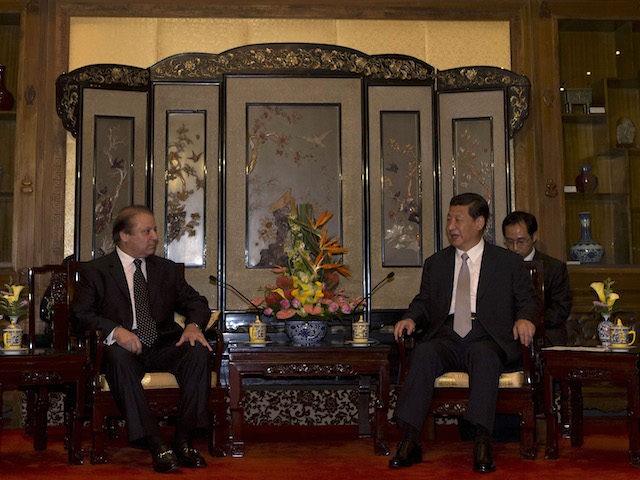China is increasingly providing military and economic assistance to Pakistan amid deadly confrontations between Islamabad and New Delhi over the Muslim-majority Himalayan region of Kashmir.
Pakistan receives more weapons from China, the world’s third-largest arms supplier, than any other country, according to the Stockholm International Peace Research Institute.
The primary purpose of Beijing’s assistance to Pakistan is to contain the rise of their mutual rival India, according to the most recent annual report to Congress issued by the U.S.-China Economic and Security Review Commission.
Although economically and militarily China is currently more powerful than India, the report notes:
China exploits the longstanding rivalry between India and Pakistan to ensure its own ambitions in South Asia are achieved. This strategy aims to keep India so preoccupied with its western neighbor that it will not have the ability to mount a serious challenge to China’s power and influence in Asia…
China’s relationship with Pakistan has been defined by mutual animosity toward India since the early 1960s..Since then, China’s increasingly sophisticated military assistance to Pakistan — particularly on missiles and nuclear weapons—has been instrumental to Pakistan’s ability to credibly threaten India’s security.
China’s assistance to Pakistan dates back to the early 1960s when China-India relations began to deteriorate over Tibet and a border dispute that included parts of the Kashmir region.
Pakistan and China grew closer after the 1962 Sino-Indian border war and the 1965 Ind0-Pakistani war.
China has managed to remain in the shadows of the ongoing deadly clashes between Pakistan and India along their mutual border in Kashmir.
All three countries — China, India, and Pakistan — have competing claims to the Himalayan region.
China’s autonomous province of Xinjiang, home to the country’s largest concentration of the Muslim Uighur minority, borders Pakistan-occupied Kashmir.
The U.S. commission reports to Congress:
Although China has never intervened in an India-Pakistan conflict on Pakistan’s behalf, its diplomatic, material, training, and intelligence support have enabled Pakistan to present a formidable military challenge to India
…
China’s support for Pakistan is driven in large part by shared concerns about India: for China, India represents a potential challenge to China’s regional dominance. For Pakistan, India represents the country’s top security threat, a perception informed by their history of partition, four wars, territorial disputes, terrorism, and overall deep-seated distrust.
Despite U.S. sanctions, China played an instrumental role in enabling Pakistan’s ballistic missile capability in the 1980s and 1990s. Moreover, China assisted Pakistan in building its first nuclear bomb. China is still providing assistance to Pakistan’s nuclear program.
“The border dispute remains the most likely source of armed conflict between China and India, although the probability of such a confrontation is low, particularly if other facets of the relationship are relatively calm,” points out the commission.
It adds, “Geographically, the border dispute spans several sections of the two countries’ 2,500-mile-long border,” including “a 14,670-square-mile area that China has occupied since the 1962 war but which India claims as part of the state of Jammu and Kashmir (which in turn is contested by Pakistan)…”
A copy of the report was disseminated during the Parliamentary Intelligence-Security Forum on Wednesday hosted by Rep. Robert Pittenger (R-NC), chairman of the Congressional Task Force on Terrorism and Unconventional Warfare
Various Members of Parliament, Senators, Ambassadors, and other officials from 39 nations in Europe, Asia, Middle East, and South America attended the event.

COMMENTS
Please let us know if you're having issues with commenting.